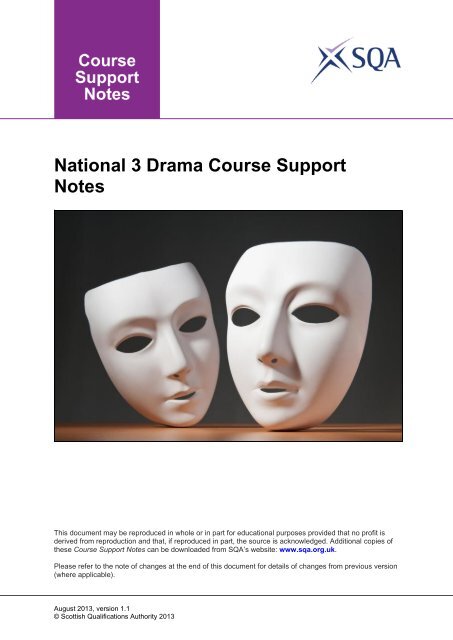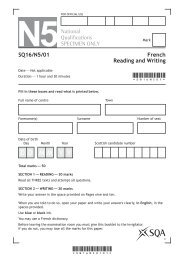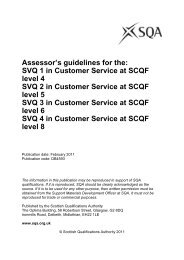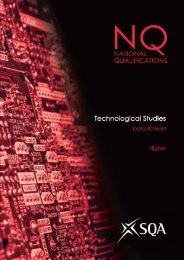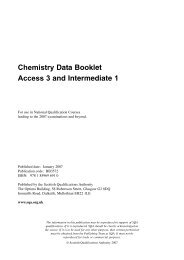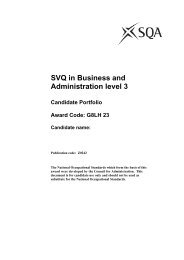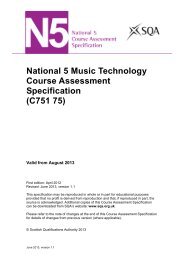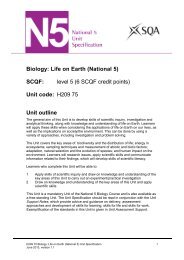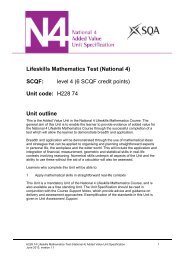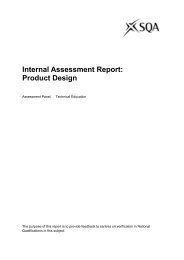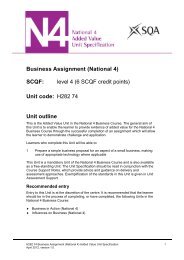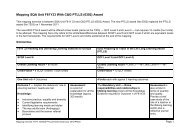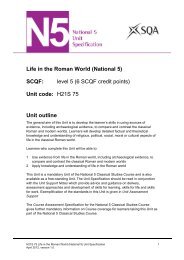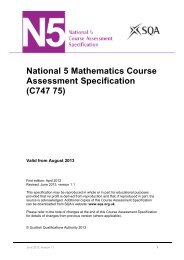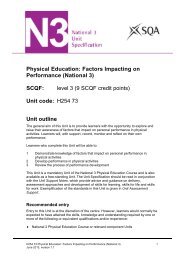National 3 Drama Course Support Notes - Scottish Qualifications ...
National 3 Drama Course Support Notes - Scottish Qualifications ...
National 3 Drama Course Support Notes - Scottish Qualifications ...
Create successful ePaper yourself
Turn your PDF publications into a flip-book with our unique Google optimized e-Paper software.
<strong>National</strong> 3 <strong>Drama</strong> <strong>Course</strong> <strong>Support</strong><br />
<strong>Notes</strong><br />
This document may be reproduced in whole or in part for educational purposes provided that no profit is<br />
derived from reproduction and that, if reproduced in part, the source is acknowledged. Additional copies of<br />
these <strong>Course</strong> <strong>Support</strong> <strong>Notes</strong> can be downloaded from SQA’s website: www.sqa.org.uk.<br />
Please refer to the note of changes at the end of this document for details of changes from previous version<br />
(where applicable).<br />
August 2013, version 1.1<br />
© <strong>Scottish</strong> <strong>Qualifications</strong> Authority 2013
Contents<br />
<strong>Course</strong> <strong>Support</strong> <strong>Notes</strong><br />
Introduction 1<br />
General guidance on the <strong>Course</strong> 2<br />
Approaches to learning and teaching 7<br />
Approaches to assessment 13<br />
Equality and inclusion 17<br />
Appendix 1: Reference documents 18<br />
Appendix 2: <strong>Drama</strong> lexicon 19<br />
Administrative information 21<br />
Unit <strong>Support</strong> <strong>Notes</strong> — <strong>Drama</strong> Skills (<strong>National</strong> 3) 22<br />
Introduction 23<br />
General guidance on the Unit 24<br />
Approaches to learning and teaching 25<br />
Approaches to assessment 28<br />
Equality and inclusion 29<br />
Appendix 1: Reference documents 30<br />
Administrative information 31<br />
Unit <strong>Support</strong> <strong>Notes</strong> — <strong>Drama</strong>: Production Skills (<strong>National</strong> 3) 32<br />
Introduction 33<br />
General guidance on the Unit 34<br />
Approaches to learning and teaching 35<br />
Approaches to assessment and gathering evidence 38<br />
Equality and inclusion 39<br />
Appendix 1: Reference documents 40<br />
Administrative information 41
Introduction<br />
These support notes are not mandatory. They provide advice and guidance on<br />
approaches to delivering and assessing the <strong>National</strong> 3 <strong>Drama</strong> <strong>Course</strong>. They are<br />
intended for teachers and lecturers who are delivering the <strong>Course</strong> and its Units.<br />
They should be read in conjunction with the <strong>Course</strong> Specification and the Unit<br />
Specifications for the Units in the <strong>Course</strong>.<br />
The <strong>National</strong> 3 <strong>Drama</strong> <strong>Course</strong> has been benchmarked against the <strong>Scottish</strong> Credit<br />
and <strong>Qualifications</strong> Framework (SCQF) at SCQF level 3. The <strong>Course</strong> has two<br />
mandatory Units.<br />
<strong>Course</strong> <strong>Support</strong> <strong>Notes</strong> for <strong>National</strong> 3 <strong>Drama</strong> 1
General guidance on the <strong>Course</strong><br />
Aims<br />
The <strong>National</strong> 3 <strong>Drama</strong> <strong>Course</strong> is designed to provide opportunities for learners to<br />
develop skills in creating and presenting drama. This <strong>Course</strong> focuses on the<br />
development of basic drama skills and using basic production skills to present<br />
drama.<br />
The aims of the <strong>Course</strong> are to enable learners to:<br />
generate thoughts and ideas at a basic level when creating drama<br />
have an awareness of social and cultural influences on drama<br />
present drama at a basic level<br />
use basic production skills to present drama<br />
develop problem solving skills by creating and presenting drama<br />
reflect on their work and that of other learners<br />
As learners develop practical skills in creating and presenting, they will also<br />
develop an awareness of cultural and social influences on drama. Learners will<br />
investigate and reflect on how the use of self-expression, language and<br />
movement can develop their drama ideas. Learners will develop problem-solving<br />
skills as they explore and develop a range of basic drama skills. They will also<br />
investigate the use of basic production skills to enhance drama.<br />
Progression into this <strong>Course</strong><br />
Entry to this Unit is at the discretion of the centre. However learners would<br />
normally be expected to have attained the skills, knowledge and understanding<br />
required by one or more of the following or equivalent qualifications and/or<br />
experience:<br />
<strong>National</strong> 2 Performance Arts <strong>Course</strong> or relevant component Units<br />
<strong>National</strong> 2 Creative Arts <strong>Course</strong> or relevant component Units<br />
Experiences and outcomes<br />
<strong>National</strong> <strong>Course</strong>s have been designed to draw on and build on the curriculum<br />
experiences and outcomes as appropriate. <strong>Qualifications</strong> developed for the<br />
senior phase of secondary education are benchmarked against SCQF levels.<br />
SCQF level 3 and the curriculum level 3 are broadly equivalent in terms of level<br />
of demand although qualifications at SCQF level 3 will be more specific to allow<br />
for more specialist study of subjects.<br />
Learners who have completed Curriculum for Excellence experiences and<br />
outcomes will find these an appropriate basis for doing the <strong>Course</strong>.<br />
Centres wishing to establish the suitability of learners without prior qualifications<br />
and/or experiences and outcomes may benefit from carrying out a review of prior<br />
life and work experiences. This approach may be particularly useful for adult<br />
returners to education.<br />
<strong>Course</strong> <strong>Support</strong> <strong>Notes</strong> for <strong>National</strong> 3 <strong>Drama</strong> 2
Skills, knowledge and understanding covered<br />
in this <strong>Course</strong><br />
This section provides further advice and guidance about skills, knowledge and<br />
understanding that could be included in the <strong>Course</strong>.<br />
The skills, knowledge and understanding stated in the <strong>Course</strong> Specification will<br />
be developed throughout the <strong>Course</strong>. Some Units may offer more opportunities<br />
than others for the development of skills, knowledge and understanding as<br />
suggested in the table below:<br />
Skills knowledge and <strong>Drama</strong> Skills <strong>Drama</strong>: Production Skills<br />
understanding within<br />
the <strong>Course</strong><br />
Responding to stimuli to<br />
create drama <br />
Working with others, in<br />
order to share and use<br />
ideas for drama<br />
Showing awareness of<br />
social and cultural<br />
influences when creating<br />
drama<br />
<br />
<br />
<br />
<br />
Exploring drama form,<br />
structure <br />
Gaining awareness of<br />
basic production skills<br />
Using basic drama and<br />
production skills when<br />
presenting<br />
Using reflective skills<br />
<br />
<br />
<br />
<br />
<br />
<strong>Course</strong> <strong>Support</strong> <strong>Notes</strong> for <strong>National</strong> 3 <strong>Drama</strong> 3
Some Units may offer more opportunities than others for the development of skills<br />
for learning, skills for life and skills for work, as suggested in the table below:<br />
Responding to stimuli to create drama<br />
In the Units <strong>Drama</strong> Skills and <strong>Drama</strong>: Production Skills, the chosen stimulus<br />
could allow learners to respond to and develop ideas through class<br />
discussions.<br />
Working with others, in order to share and use ideas for drama<br />
Learners could work in groups of differing sizes. For example, in <strong>Drama</strong>:<br />
Production Skills, while the whole group undertakes activities related to the<br />
chosen stimulus, individual learners could also contribute to different<br />
production areas, such as, lighting, sound, costume, props and make-up.<br />
In order to make connections between the different areas it is important for<br />
learners to develop an awareness of all production areas.<br />
Learners could respond to and develop ideas through class discussions and<br />
evidence could be recorded in a number of ways such as, written, oral, audio,<br />
video, mind-maps, diaries, log books and folios.<br />
Showing awareness of social and cultural influences when creating<br />
drama<br />
In discussing stimuli, learners could be encouraged to explore and develop<br />
awareness of the social and cultural influences when creating drama<br />
During this process learners could for example, explore time periods or<br />
locations, in order to bring credibility to their performance.<br />
For example, a group selecting stimuli relating to World War 2, would need to<br />
be aware of the fashions, gender roles, language use, appropriate objects and<br />
music of that time.<br />
This could be evidenced in a variety of ways, for example from drawings,<br />
internet research, notes taken from watching films set in that period and<br />
discussions with the teacher/lecturer.<br />
Exploring drama form and structure<br />
Developing knowledge of form and structure could be achieved through<br />
various introductory activities. This knowledge could be used by learners to<br />
experiment and consider what they want to communicate to an audience.<br />
It could allow them to decide on the best way to use drama conventions, (eg<br />
through mime, improvisation, tableaux and so forth).<br />
Teachers/lecturers could encourage learners at this level to consider nonlinear<br />
and linear approaches to their drama through experimentation with<br />
drama skills. In addition, learners could experiment with a number of drama<br />
forms in order to select an appropriate form.<br />
During this process, teachers/lecturers could use open-ended questioning to<br />
prompt and guide learner discussion and to confirm the learners’<br />
understanding of form and structure. This approach could also be used to help<br />
learners reflect on their own ideas.<br />
<strong>Course</strong> <strong>Support</strong> <strong>Notes</strong> for <strong>National</strong> 3 <strong>Drama</strong> 4
Gaining awareness of basic production skills<br />
Both Units will involve learners using production skills, although there may be<br />
more opportunities for this in the <strong>Drama</strong>: Production Skills Unit.<br />
In the <strong>Drama</strong>: Production Skills Unit, learners could have the opportunity to<br />
explore and use production skills, before selecting an area to develop for<br />
presentation.<br />
Learners may choose from different production areas, such as lighting, sound,<br />
costume, props and make-up.<br />
Teachers/lecturers could use a range of approaches, such as internet<br />
research, recorded tutorials, demonstrations and practical workshops. This<br />
could encourage learners to experiment with staging, time periods, locations<br />
and characterisation to allow generation of ideas for their chosen role.<br />
Learners could record their evidence in a variety of formats in diaries/log<br />
Books and folios. These may include planning sheets, cue sheets, drawings,<br />
photographs, charts and lists.<br />
Using basic drama and production skills when presenting<br />
Learners will be required to portray character and demonstrate their ability to<br />
use production skills across the <strong>Course</strong>.<br />
In preparing learners, the teacher/lecturer should build in opportunities for<br />
learners to perform their drama/character in order to receive feedback. This<br />
will allow learners to develop their characterisation skills and refine use of<br />
drama form and structure.<br />
Activities may include devising and/or creating lighting effects, using sound,<br />
and/or, selecting props and/or adapting pieces of costume, and using stage<br />
make-up.<br />
An informal small-scale performance will be required to an appropriate<br />
selected audience (this could be an invited audience) for the performance.<br />
Using reflective skills<br />
Learners could gain confidence by expressing their ideas either back to the<br />
class or in small group discussion. This could also help learners to structure<br />
and sequence their thinking.<br />
During this process, teachers/lecturers could use open ended questioning to<br />
prompt and guide discussion and to confirm the learners’ understanding of<br />
drama. This approach could also be used to help learners self-reflect on their<br />
own creative work and ideas.<br />
Constructive feedback could be provided by the teacher/lecturer to help<br />
learners feel valued which could help develop learners’ skills and enhance<br />
their work.<br />
<strong>Course</strong> <strong>Support</strong> <strong>Notes</strong> for <strong>National</strong> 3 <strong>Drama</strong> 5
Progression from this <strong>Course</strong><br />
This <strong>Course</strong> or its components may provide progression to:<br />
<strong>National</strong> 4 <strong>Drama</strong> <strong>Course</strong> or relevant component Units<br />
further study, employment or training<br />
Hierarchies<br />
Hierarchy is the term used to describe <strong>Course</strong>s and Units which form a<br />
structured sequence involving two or more SCQF levels.<br />
It is important that any content in a <strong>Course</strong> and/or Unit at one particular SCQF<br />
level is not repeated if a learner progresses to the next level of the hierarchy.<br />
The skills and knowledge should be able to be applied to new content and<br />
contexts to enrich the learning experience. This is for centres to manage.<br />
The Units in the <strong>Drama</strong> <strong>Course</strong>s from <strong>National</strong> 3 to Advanced Higher level are<br />
designed in a hierarchy.<br />
Learners may be able to achieve and be certificated for an individual Unit at the<br />
level above the level of the <strong>Course</strong> they are completing. This could be achieved<br />
for example, by learners within the class group completing similar activities and<br />
their work being differentiated and benchmarked against the assessment<br />
standards and evidence requirements at different SCQF levels.<br />
Centres should be aware that although the mandatory knowledge and skill set is<br />
similar across the hierarchical Units, there are differences in the:<br />
depth of underpinning knowledge and understanding<br />
complexity of applied skills<br />
Additional information and guidance on possible approaches and strategies are<br />
included in the ‘Approaches to learning and teaching’ section. This section also<br />
provides useful suggestions for teachers/lecturers dealing with learners working<br />
at different levels in the one class.<br />
Centres should take care to ensure that learners progressing from one level to<br />
the next are exposed to different contexts for learning and assessment to avoid<br />
repetition.<br />
<strong>Course</strong> <strong>Support</strong> <strong>Notes</strong> for <strong>National</strong> 3 <strong>Drama</strong> 6
Approaches to learning and<br />
teaching<br />
Effective learning and teaching will draw on a variety of approaches to enrich the<br />
experience of learners. In particular, practical approaches to learning and<br />
teaching which provide opportunities for personalisation and choice will help to<br />
motivate and challenge learners.<br />
The <strong>Drama</strong> Skills Unit will focus on the drama process and the development of<br />
learners’ drama skills and characterisation.<br />
Suggested approaches may include the following:<br />
discussing stimuli to help generate ideas<br />
discussing ideas for situation<br />
experimenting with and selecting ideas for the development of the drama<br />
considering drama form<br />
considering the target audience<br />
developing character<br />
planning overall structure for drama<br />
reflecting and discussing improvements<br />
organising, making decisions, solving problems<br />
adding theatre arts (lights, sound, costume, props and make-up)<br />
rehearsing<br />
presenting<br />
reflecting<br />
The <strong>Drama</strong>: Production Skills Unit could help learners develop knowledge of all<br />
production roles: lighting, sound, costume, props, and make-up. Learners will<br />
then select a production role to contribute towards a piece of drama.<br />
Suggested approaches may include the following:<br />
production workshops<br />
exploring production roles<br />
experimenting with production areas in response to stimuli<br />
selecting a production area and stimulus<br />
planning overall structure for drama<br />
experimenting with chosen production area<br />
organising, making decisions, and solving problems<br />
rehearsing<br />
presenting<br />
reflecting<br />
The teacher/lecturer should consider the needs of all learners particularly where<br />
a textual extract is chosen rather than devising a performance. Textual extracts<br />
could be analysed and deconstructed .Learners’ choice of stimulus could enable<br />
learners to develop a creative performance concept within their chosen<br />
production role.<br />
<strong>Course</strong> <strong>Support</strong> <strong>Notes</strong> for <strong>National</strong> 3 <strong>Drama</strong> 7
Teachers/lecturers could also consider how they can build variety into their<br />
teaching and learning approaches to meet the needs of different learning styles<br />
and preferences in the class group.<br />
Investigation of drama skills and practice could, for example, be carried out by<br />
groups of learners using technology by looking at specific websites. This<br />
resource could be added to at different stages of learning as required and used<br />
as a focus for group discussion. Innovative and creative ways of using technology<br />
could be a valuable resource in creating inclusive learning and teaching<br />
approaches which could develop the learner’s creativity.<br />
The following list could provide a number of opportunities to use technology to<br />
support learning, teaching and assessment.<br />
online research<br />
interactive activities to reinforce learning<br />
digital logs<br />
blogs capturing learners reflections on their learning<br />
Sequencing and delivery — Units and the <strong>Course</strong><br />
Sequencing and integration of the learning and teaching and assessment of the<br />
Units is at the discretion of the centre. There is no set way to approach this and<br />
the sequence and/or integration of Units may be dependent on available<br />
resources, time and staff expertise. Particular sequences of or integration of Units<br />
may suit different learners and teachers/lecturers could take this into account<br />
when considering how to approach the learning and teaching and assessment of<br />
the Units in this <strong>Course</strong>.<br />
The following approaches illustrate two possible approaches to integrating and<br />
sequencing the learning and teaching of the Units. Please note that other<br />
combinations are also possible.<br />
Approach 1:<br />
This model shows the possibility of delivering the Units sequentially, beginning<br />
with <strong>Drama</strong> Skills. This model may provide learning opportunities for those<br />
learners who have had little or no previous experience of drama. This sequential<br />
approach may provide opportunities for the progressive development,<br />
reinforcement and consolidation of creative skills, knowledge and understanding<br />
through the <strong>Course</strong>.<br />
<strong>Drama</strong> Skills<br />
<strong>Drama</strong>:<br />
Production<br />
Skills<br />
Performance<br />
or:<br />
<strong>Drama</strong>:<br />
Production<br />
Skills<br />
<strong>Drama</strong> Skills<br />
Performance<br />
<strong>Course</strong> <strong>Support</strong> <strong>Notes</strong> for <strong>National</strong> 3 <strong>Drama</strong> 8
Approach 2:<br />
This model shows the possibility of delivering the Units concurrently. This<br />
approach may benefit learners who already have some practical drama skills,<br />
knowledge and understanding from their broad general education. This approach<br />
may provide the opportunity for learners to integrate their learning, freeing up<br />
more time for a wider range of practical skills development<br />
This model can be integrated and taught in a holistic approach.<br />
<strong>Drama</strong> Skills and <strong>Drama</strong>: Production Skills –<br />
concurrent delivery<br />
Performance<br />
It is recommended that the majority of time on the <strong>Course</strong> should reflect the<br />
practical nature of the <strong>Course</strong> and take into account the individual needs of the<br />
learners.<br />
Learners could begin by working in a group to generate ideas for a performance.<br />
This approach is designed to encourage learners’ to respond creatively to stimuli.<br />
This will help learners to develop their own ideas and respond to the ideas of<br />
others.<br />
At this level, learners could need some support from the teacher/lecturer to help<br />
them consider and identify the choices and creative options open to them.<br />
Discussions with learners could be used to identify a variety of ways that they<br />
could respond imaginatively to their stimuli in a personal and informed way.<br />
During their practical activities, learners will use structure, form, genre, style and<br />
production skills. This process will help them to become more confident in their<br />
abilities to make decisions, collaborate and refine their skills.<br />
Integration within and across Units<br />
A key principle of Curriculum for Excellence qualifications is that they allow<br />
learners to acquire skills, knowledge and understanding in a meaningful and<br />
integrated way. This not only assists with retention of skills so that they may be<br />
transferable and capable of being applied to new and different contexts but it also<br />
enables the time available for delivering a <strong>Course</strong> to be used more efficiently,<br />
creating more time for learning. This same principle can also be applied to<br />
assessment.<br />
The <strong>Drama</strong> <strong>Course</strong>s have been designed to provide opportunities for learning<br />
and teaching activities which promote integration and to create opportunities for<br />
personalisation and choice for individual learning needs and interests within<br />
teaching and learning activities. Teaching approaches should support Curriculum<br />
for Excellence’s four capacities to enable each learner to develop as a successful<br />
learner, a confident individual, a responsible citizen and an effective contributor.<br />
<strong>Drama</strong> readily lends itself to a variety of delivery methods, due to its emphasis on<br />
developing creating, performing and production skills. A variety of teaching and<br />
learning approaches could be used to support effective teaching and learning,<br />
including for example, learner-centred problem-solving practical activities,<br />
researching and investigation into current performance techniques and<br />
production skills.<br />
<strong>Course</strong> <strong>Support</strong> <strong>Notes</strong> for <strong>National</strong> 3 <strong>Drama</strong> 9
Pair and group discussion could be used to widen learner’s awareness of drama<br />
practice. The benefits of group learning, peer support and peer feedback can be<br />
substantial and could also be the cornerstone of planning for learning about<br />
drama.<br />
At this level, teachers/lecturers could support learners to develop their thinking<br />
and literacy skills by using word banks linked to drama skills and production<br />
roles.<br />
Stimuli for creating drama could come in many forms and imaginative responses<br />
to stimuli should be encouraged at this level. These creative ideas are stimulated<br />
by our experiences and our senses and imagination. Generating ideas can<br />
happen in a variety of ways, such as discussions, drawings, mind-maps and<br />
research tasks.<br />
Stimuli could include, for example, text, photographs, poetry, newspaper articles,<br />
headlines, music, props, pieces of costume etc. Creative ideas could also be<br />
developed in response to external themes or topics. This approach could be<br />
useful in providing contextualised learning experiences through drama that relate<br />
to other areas of the curriculum.<br />
To help guide this process, learners should be supported to self-reflect on their<br />
learning and to discuss and/or record their thoughts as their work and ideas<br />
develop. Diaries/logbooks/folios are one way to document this process but other<br />
approaches could also be used.<br />
By supporting learners to reflect on and record their thoughts in this way, they<br />
could become more able to identify their creative choices. This approach could<br />
also be used to help them to identify strengths and areas for improvement in their<br />
work and to understand and appreciate the work of others.<br />
Learners could be supported to consider and develop their ideas in an individual<br />
way when responding to their stimulus. Open-ended questioning techniques and<br />
structured activities to reflect on their work could be used to support this process.<br />
Research may also help to further stimulate learners’ creativity as they develop<br />
their ideas. Where possible, teachers/lecturers should support the development<br />
of independent learning, helping learners to build confidence in their own creative<br />
abilities through structured activities and clearly defined tasks, providing learners<br />
with opportunities to discuss and share their ideas and experiences with others<br />
where appropriate.<br />
<strong>Course</strong> <strong>Support</strong> <strong>Notes</strong> for <strong>National</strong> 3 <strong>Drama</strong> 10
Developing skills for learning, skills for life<br />
and skills for work<br />
Teachers/lecturers should make learners aware of the skills, knowledge and<br />
understanding that they are developing throughout the <strong>Course</strong>. By considering<br />
and using tailored teaching and learning approaches, teachers/lecturers can help<br />
learners to address and develop their skills more effectively and identify ways<br />
they might improve on them.<br />
Learners are expected to develop broad generic skills as an integral part of their<br />
learning experience. The Unit Specification lists the skills for learning, skills for<br />
life and skills for work that learners should develop through this <strong>Course</strong>. These<br />
are based on SQA’s Skills Framework: Skills for Learning, Skills for Life and<br />
Skills for Work and must be built into the Unit where there are appropriate<br />
opportunities. The level of these skills will be appropriate to the level of the Unit.<br />
The table below highlights some opportunities to develop these skills during this<br />
<strong>Course</strong>.<br />
1 Literacy<br />
1.3 Listening and talking The starting point of almost every response to<br />
stimuli in the drama classroom is to discuss,<br />
generate ideas, listen to others’ ideas and develop<br />
these ideas.<br />
3 Health and wellbeing<br />
3.1 Personal learning This could be developed through a particular<br />
choice of stimulus. For example, a particular<br />
newspaper headline could be used for learners to<br />
discuss and create ideas, taking their own cultural<br />
and social experiences into account.<br />
4 Employability, enterprise and citizenship<br />
4.3 Working with others Throughout the <strong>Course</strong>, learners will be working<br />
co-operatively in various sized groupings. The<br />
development of contributing ideas and negotiating<br />
those with others sensitively will allow learners to<br />
mature and take ideas forward. <strong>Drama</strong> lends itself<br />
to learners becoming adaptable, having a set goal,<br />
working within a set of expectations and a reliance<br />
on self and others to complete tasks to achieve.<br />
Working with others could be evidenced by<br />
keeping diaries/logbooks/folios and seeing<br />
evidence of personal and group decision making in<br />
the work produced by learners. This type of<br />
ongoing reflection by learners could be used to<br />
help teachers/lecturers monitor learner progress<br />
and to help learners identify next steps for learning.<br />
<strong>Course</strong> <strong>Support</strong> <strong>Notes</strong> for <strong>National</strong> 3 <strong>Drama</strong> 11
5 Thinking skills<br />
5.2 Understanding<br />
5.5 Creating<br />
Questions or prompts designed by the<br />
teacher/lecturer, could be used to help guide<br />
learners to reflect on their own work and skills and<br />
when discussing the stimuli. Word banks of drama<br />
terms could be used to help learners describe the<br />
techniques, form, structure, production skills in<br />
meaningful ways.<br />
Learning about production skills through practical<br />
workshops, watching live/recorded performance<br />
can be used to help learners to consider their own<br />
creative decisions and choices. This could include<br />
developing a basic awareness of production skills.<br />
Teachers/lecturers should also think about the sort of assessment approaches<br />
that encourage different kinds of skills. Additional advice and guidance on useful<br />
assessment approaches for skills building is given in the section ‘Approaches to<br />
assessment’.<br />
During the delivery of the <strong>Course</strong> there may also be opportunities for learners to<br />
develop their communication skills. Communication skills are particularly<br />
important for learners as these skills allow them to access, engage in, and<br />
understand their learning and to communicate their thoughts, ideas and opinions.<br />
<strong>Course</strong> <strong>Support</strong> <strong>Notes</strong> for <strong>National</strong> 3 <strong>Drama</strong> 12
Approaches to assessment<br />
The publication Building the Curriculum 5 sets out a framework for assessment<br />
which offers guidance on approaches to recognising achievement, profiling and<br />
reporting. Research in assessment suggests that learners learn best, and<br />
attainment improves, when learners:<br />
understand clearly what they are trying to learn, and what is expected of them<br />
are given feedback about the quality of their work, and what they can do to<br />
make it better<br />
are given advice about how to go about making improvements<br />
are fully involved in deciding what needs to be done next, and who can give<br />
them help if they need it<br />
(http://scotland.gov.uk/Publications/2005/09/20105413/54156)<br />
Assessment is the process of evaluating an individual’s learning. It involves<br />
generating and collecting evidence of learners’ attainment of knowledge and<br />
skills and judging that evidence against defined standards. When Units are being<br />
completed as part of the <strong>Drama</strong> <strong>Course</strong>, assessment should enable learners to<br />
develop skills, knowledge and understanding required for successful future<br />
learning.<br />
The <strong>National</strong> Assessment Resource supports teachers in developing a shared<br />
understanding of standards and expectations.<br />
Where possible, approaches to assessment should encourage personalisation<br />
and choice for learners in assessment methods and processes and support<br />
learning and teaching. Building the Curriculum 5: a framework for assessment<br />
also recommends that learners receive accurate and regular feedback regarding<br />
their learning and are actively involved in the assessment process.<br />
It is important that different approaches to assessment are used by<br />
teachers/lecturers to suit the varying needs of learners Teachers/lecturers should<br />
also use inclusive approaches to assessment taking account of any specific<br />
needs of their learners.<br />
Assessment should:<br />
cover subject content at the appropriate level without bias or stereotyping<br />
use content, resources and assessment materials that recognise the<br />
achievements and contributions of different groups<br />
where appropriate, provide a balance of assessment methods and encourage<br />
alternative approaches<br />
Assessment can take place in a variety of settings, such as classrooms, lecture<br />
rooms, workplaces (or in a simulation of workplace conditions), community and<br />
training establishments or examination halls. No matter where it takes place or<br />
what form it takes, assessment always involves observation, product evaluation,<br />
questioning or a combination of some or all of these three things.<br />
A variety of approaches can be used for assessment in <strong>Drama</strong>. Some examples<br />
are provided in the section below. These are general illustrative examples which<br />
cover the main forms of assessment applicable to <strong>Drama</strong>.<br />
<strong>Course</strong> <strong>Support</strong> <strong>Notes</strong> for <strong>National</strong> 3 <strong>Drama</strong> 13
These examples complement information in the earlier sections on teaching and<br />
learning and developing subject skills knowledge and understanding in the<br />
<strong>Course</strong>:<br />
Observation<br />
Reflection<br />
Questioning<br />
Personal<br />
interviews<br />
of naturally occurring skills using an observation checklist<br />
of drama and production skills<br />
checking underpinning knowledge of the subject<br />
discussing creative options and choices with learners<br />
Assessment for the Unit could comprise written, oral and/or recorded and<br />
practical evidence. Much of it will occur naturally as the <strong>Course</strong> progresses.<br />
Observation to record evidence of naturally occurring skills, for example<br />
responding to stimuli, working with others, exploring drama form and<br />
structure, using drama and production skills when presenting. In day-to-day<br />
teaching and learning there may be opportunities in the delivery of the Units<br />
in a <strong>Course</strong> to observe learners providing evidence which satisfies,<br />
completely or partially, a Unit or Units. This is naturally occurring evidence<br />
and this evidence can be recorded as evidence using an observation<br />
checklist.<br />
Questioning could be in written and/or oral form. It can be useful to help<br />
confirm that learners’ understanding of the subject is secure. This could be<br />
used to help teachers/lecturers plan for future teaching and learning activities<br />
and to reinforce understanding of the subject area. Evidence of this<br />
understanding may also be visible in, for example, a log, or diary, or folio in<br />
which they evaluate their ongoing progress. This log can be differentiated in<br />
that more support can be given to those learners who may need it in terms of<br />
shorter answers and more structured questions rather than an open-ended<br />
response. The log could be written and/or recorded.<br />
Learners could keep records of diagrams, production cue sheets,<br />
photographs, notes to support their ideas.<br />
Personal Interviews with learners on a one-to-one basis can help<br />
teachers/lecturers ensure that learners are supported to recognise the<br />
development of their drama and production skills.<br />
It is recommended that teacher/lecturers involve learners in the identification of<br />
assessment opportunities and build in opportunities for regular feedback on<br />
progress. This will ensure that learners are clear about what is expected of them.<br />
Assessment methods should offer all learners an equal opportunity to<br />
demonstrate their achievement. This should be reflected in the language used,<br />
the use of different assessment presentation methods and the use of appropriate<br />
and unbiased illustrative materials which reflect an inclusive view.<br />
<strong>Course</strong> <strong>Support</strong> <strong>Notes</strong> for <strong>National</strong> 3 <strong>Drama</strong> 14
In general, teaching strategies in the <strong>Course</strong> should allow learners to:<br />
learn progressively and independently where appropriate<br />
work co-operatively with others<br />
work creatively in a well-ordered manner and relaxed atmosphere<br />
plan tasks and produce work within deadlines<br />
develop and apply knowledge, understanding and skills in drama contexts<br />
personally respond to their chosen stimulus<br />
produce imaginative and creative drama<br />
be involved in self- assessment developing their thinking and personal<br />
awareness<br />
be inspired and motivated during creative tasks and activities<br />
adopt a positive attitude to, and take pride in, their work<br />
make links with their existing knowledge and experience of drama to other<br />
areas of the curriculum<br />
This is illustrated in the diagram below:<br />
How can you<br />
make time for<br />
effective<br />
feedback and<br />
reflection?<br />
How can you help<br />
learners make<br />
connections with<br />
prior learning?<br />
How can you help<br />
learners to ask<br />
and formulate<br />
questions?<br />
How can you<br />
provide peer/selfassessment<br />
opportunities?<br />
How do you<br />
explain the<br />
purpose of the<br />
learning activity?<br />
How can you use<br />
and develop the<br />
skills of all<br />
learners?<br />
Planning<br />
teaching,<br />
learning and<br />
assessment<br />
How can you help<br />
to identify the<br />
relevance of<br />
learning?<br />
How can you<br />
review and refine<br />
lesson planning?<br />
How can you use<br />
imagery/pictorial<br />
previews of<br />
content?<br />
How can you<br />
contextualise<br />
learning to real<br />
life/work<br />
practices?<br />
How can you use<br />
differentiated<br />
materials?<br />
How can you<br />
appropriately<br />
stage and pace<br />
learning?<br />
How can you use<br />
exemplar work to<br />
discuss and<br />
inform<br />
standards?<br />
<strong>Course</strong> <strong>Support</strong> <strong>Notes</strong> for <strong>National</strong> 3 <strong>Drama</strong> 15
Combining assessment across Units<br />
If the Units are delivered as part of the <strong>Course</strong>, assessment can be combined.<br />
Where Units are delivered as part of a <strong>Course</strong>, it is important to ensure that Units<br />
prepare learners for <strong>Course</strong> assessment in terms of the skills, knowledge and<br />
understanding which they help develop.<br />
Integrating assessment minimises repetition, allows more time for learning across<br />
the <strong>Course</strong> as a whole and allows centres to manage the assessment process<br />
more efficiently. Using an integrated approach to assessment will also:<br />
enrich the assessment process for the learner and the assessor by bringing<br />
together elements of different Units<br />
make more sense to the learner and avoid over-assessment and/or<br />
duplication of assessment<br />
allow for evidence for particular Units to be drawn from a range of activities<br />
provide a rigorous approach to the assessment process<br />
When assessment is combined across Units, teachers/lecturers should take<br />
particular care to track learners’ achievement of the Outcomes and Assessment<br />
Standards. Tracking will assist with identifying any necessary reassessment and<br />
will also provide evidence of achievement for those learners who do not achieve<br />
the whole <strong>Course</strong>.<br />
Approaches to the assessment of individual Units are given in the Unit <strong>Support</strong><br />
<strong>Notes</strong>.<br />
<strong>Course</strong> <strong>Support</strong> <strong>Notes</strong> for <strong>National</strong> 3 <strong>Drama</strong> 16
Equality and inclusion<br />
At all times, teachers/lecturers should use inclusive approaches to assessment<br />
taking into account the needs and experiences of their learners.<br />
If a learner has a disability, centres could provide where appropriate, the<br />
following support:<br />
recording texts for visually impaired learners<br />
ensuring that learners who may have a physical disability can use suitable<br />
equipment to demonstrate an appropriate skill<br />
supporting learners with learning difficulties such as dyslexia or dyspraxia in<br />
their understanding and planning<br />
For learners with autistic spectrum disorders, engaging and responding to an<br />
appreciation of the work of others and communicating personal thoughts, feelings<br />
and ideas for stimuli and/or texts may prove difficult.<br />
Teachers/lecturers should consider the age of their learners and the suitability of<br />
stimuli and/or texts that will be used in the classroom. Suitability considerations<br />
should include providing a variety of choices which avoid gender stereotyping<br />
and awareness of any potential sensitivity to religion. Classroom resources and<br />
teaching should be developed avoiding stereotyping and taking account of any<br />
possible gender bias.<br />
Centres should use the flexibility within the Unit and <strong>Course</strong> structure to generate<br />
evidence of competence, making use of the variety of ways that learners can<br />
demonstrate the necessary evidence of achievement. For some learners this<br />
could include the use of ‘practical’ helpers, readers, scribes, adapted equipment<br />
or assistive technologies. Extra time may be of help for learners with autistic<br />
spectrum disorders and the use of a prompter could be used to support the<br />
learner in the assessment situation.<br />
In the <strong>Course</strong>, alternative approaches to Unit assessment can be used, taking<br />
account of the specific needs of learners. However, the centre must be satisfied<br />
that the integrity of the assessment is maintained and that the alternative<br />
approach to assessment will in fact generate the necessary evidence of<br />
achievement.<br />
It is recognised that centres have their own duties under equality and other<br />
legislation and policy initiatives. The guidance given in these <strong>Course</strong> <strong>Support</strong><br />
<strong>Notes</strong> is designed to sit alongside these duties but is specific to the delivery and<br />
assessment of the <strong>Course</strong>.<br />
It is important that centres are aware of and understand SQA’s assessment<br />
arrangements for disabled learners, and those with additional support needs,<br />
when making requests for adjustments to published assessment arrangements.<br />
Centres will find more guidance on this in the series of publications on<br />
assessment arrangements on SQA’s website: www.sqa.org.uk/sqa//14977.html.<br />
<strong>Course</strong> <strong>Support</strong> <strong>Notes</strong> for <strong>National</strong> 3 <strong>Drama</strong> 17
Appendix 1: Reference documents<br />
The following reference documents will provide useful information and<br />
background.<br />
Assessment Arrangements (for disabled candidates and/or those with<br />
additional support needs) — various publications are available on SQA’s<br />
website at: www.sqa.org.uk/sqa//14977.html.<br />
Building the Curriculum 4: Skills for learning, skills for life and skills for work<br />
Building the Curriculum 5: A framework for assessment<br />
<strong>Course</strong> Specifications<br />
Design Principles for <strong>National</strong> <strong>Course</strong>s<br />
Guide to Assessment (June 2008)<br />
Overview of Qualification Reports<br />
Principles and practice papers for curriculum areas<br />
SCQF Handbook: User Guide (published 2009) and<br />
SCQF level descriptors (to be reviewed during 2011 to 2012):<br />
www.sqa.org.uk/sqa/4595.html<br />
SQA Skills Framework: Skills for Learning, Skills for Life and Skills for Work<br />
Skills for Learning, Skills for Life and Skills for Work: Using the Curriculum<br />
Tool<br />
<strong>Course</strong> <strong>Support</strong> <strong>Notes</strong> for <strong>National</strong> 3 <strong>Drama</strong> 18
Appendix 2: <strong>Drama</strong> lexicon<br />
General terms Movement Voice Conventions Form<br />
Stimulus<br />
Characterisation<br />
Target audience<br />
Mime<br />
Body language<br />
Facial expression<br />
Accent<br />
Pace<br />
Volume<br />
Flashback<br />
Flashforward<br />
Freeze frame<br />
A play, scripted or<br />
improvised<br />
Dance drama<br />
Mood<br />
Atmosphere<br />
Directing<br />
Design concepts<br />
Purpose<br />
Focus<br />
Tension<br />
Gesture<br />
Naturalistic<br />
Stylised<br />
Balance<br />
Speed<br />
Timing<br />
Mime<br />
Monologue<br />
Movement<br />
Slow motion<br />
Mime<br />
Monologue<br />
Movement<br />
Musical<br />
Pantomime<br />
<strong>Course</strong> <strong>Support</strong> <strong>Notes</strong> for <strong>National</strong> 3 <strong>Drama</strong> 19
Genre Structure Style Characterisation<br />
techniques<br />
Production areas<br />
Comedy<br />
Order of scenes<br />
Naturalistic<br />
Character cards<br />
Lighting<br />
Tragedy<br />
Non-naturalistic<br />
Improvisation<br />
Sound<br />
Melodrama<br />
Role play<br />
Costume<br />
Docudrama<br />
Make up<br />
Props<br />
The above list is simply a guide. It is designed to inform teaching and learning and to support learners as they move through the <strong>Course</strong>work at<br />
<strong>National</strong> 3. It should be noted that it is neither prescriptive nor exhaustive but the terms used reflect what can be asked about during aspects of<br />
Unit assessment at this level.<br />
<strong>Course</strong> <strong>Support</strong> <strong>Notes</strong> for <strong>National</strong> 3 <strong>Drama</strong> 20
Administrative information<br />
Published: August 2013 (version 1.1)<br />
History of changes to <strong>Course</strong> <strong>Support</strong> <strong>Notes</strong><br />
<strong>Course</strong><br />
details<br />
Version Description of change Authorised<br />
by<br />
1.1 General consistency amendments. <strong>Qualifications</strong><br />
Development<br />
<strong>Drama</strong> lexicon added in Appendix 2. Manager<br />
Date<br />
August<br />
2013<br />
© <strong>Scottish</strong> <strong>Qualifications</strong> Authority 2013<br />
This document may be reproduced in whole or in part for educational purposes<br />
provided that no profit is derived from reproduction and that, if reproduced in part,<br />
the source is acknowledged. Additional copies can be downloaded from SQA’s<br />
website at www.sqa.org.uk.<br />
Note: You are advised to check SQA’s website (www.sqa.org.uk) to ensure you<br />
are using the most up-to-date version.<br />
<strong>Course</strong> <strong>Support</strong> <strong>Notes</strong> for <strong>National</strong> 3 <strong>Drama</strong> <strong>Course</strong> 21
Unit <strong>Support</strong> <strong>Notes</strong> — <strong>Drama</strong> Skills<br />
(<strong>National</strong> 3)<br />
This document may be reproduced in whole or in part for educational purposes provided that no profit is<br />
derived from reproduction and that, if reproduced in part, the source is acknowledged. Additional copies of<br />
these Unit <strong>Support</strong> <strong>Notes</strong> can be downloaded from SQA’s website: www.sqa.org.uk.<br />
Please refer to the note of changes at the end of this document for details of changes from previous version<br />
(where applicable).
Introduction<br />
These support notes are not mandatory. They provide advice and guidance on<br />
approaches to delivering and assessing the <strong>Drama</strong> Skills (<strong>National</strong> 3) Unit. They<br />
are intended for teachers and lecturers who are delivering this Unit. They should<br />
be read in conjunction with:<br />
the <strong>Drama</strong> Skills (<strong>National</strong> 3) Unit Specification<br />
the <strong>National</strong> 3 <strong>Drama</strong> <strong>Course</strong> Specification<br />
the <strong>National</strong> 3 <strong>Drama</strong> <strong>Course</strong> <strong>Support</strong> <strong>Notes</strong><br />
the appropriate assessment support materials<br />
If the Unit <strong>Support</strong> <strong>Notes</strong> have been developed for a Unit which is not part of a<br />
<strong>Course</strong>, then it is only necessary to read them in conjunction with the Unit<br />
Specification.<br />
Unit <strong>Support</strong> <strong>Notes</strong> for <strong>Drama</strong> Skills (<strong>National</strong> 3) Unit 23
General guidance on the Unit<br />
Aims<br />
The general aim of this Unit is to provide learners with the skills and awareness<br />
to create and present drama through the exploration and use of basic drama<br />
skills. Learners will respond to stimuli, generate ideas and use basic drama skills<br />
to portray character. Learners will explore the social and cultural influences on<br />
drama. They will learn how to reflect on their use of drama skills and the drama<br />
skills of others<br />
Learners who complete this Unit will be able to:<br />
1 Use basic drama skills<br />
Progression into this Unit<br />
Entry to this Unit is at the discretion of the centre. However learners would<br />
normally be expected to have attained the skills, knowledge and understanding<br />
required by one or more of the following or equivalent qualifications and/or<br />
experience:<br />
<strong>National</strong> 2 Performance Arts <strong>Course</strong><br />
<strong>National</strong> 2 Creative Arts <strong>Course</strong><br />
Skills, knowledge and understanding covered<br />
in this Unit<br />
Additional information and suggestions for developing skills, knowledge and<br />
understanding are provided in the <strong>Course</strong> <strong>Support</strong> <strong>Notes</strong> for centres delivering<br />
this Unit as part of the <strong>National</strong> 3 <strong>Drama</strong> <strong>Course</strong>.<br />
If this Unit is being delivered on a free-standing basis, teachers and lecturers are<br />
free to select the skills, knowledge, understanding and contexts which are most<br />
appropriate for delivery in their centres.<br />
Examples of suitable contexts in which the skills, knowledge and understanding<br />
for this Unit could be developed are detailed in the ‘Approaches to learning,<br />
teaching and assessment’ section.<br />
Progression from this Unit<br />
This Unit may provide progression to:<br />
<strong>National</strong> 4 <strong>Drama</strong> <strong>Course</strong> or relevant component Units<br />
further study, employment and/or training<br />
Unit <strong>Support</strong> <strong>Notes</strong> for <strong>Drama</strong> Skills (<strong>National</strong> 3) Unit 24
Approaches to learning and<br />
teaching<br />
This section provides advice and guidance and some examples of approaches to<br />
learning, teaching and assessment that could be used to deliver this Unit.<br />
Sequencing and timing<br />
This Unit has two Outcomes which can be delivered and assessed in a variety of<br />
ways. The Outcomes are, however, designed to be delivered sequentially. There<br />
is no specific amount of time set aside for the delivery and assessment of each<br />
Outcome. This will depend on the needs of the learners and their prior skills,<br />
knowledge and understanding.<br />
Possible approaches to learning and teaching<br />
The main focus of this Unit will be the development of knowledge of the process<br />
involved in creating drama (the drama process) in response to stimuli.<br />
It is important for the teacher/lecturer to review the starting point of each learner.<br />
To this end, introductory activities could take place as a base for development.<br />
This also allows the teacher/lecturer to put differentiated activities into place in<br />
order to support those learners with additional learning needs.<br />
There are a variety of introduction activities available to help encourage trust,<br />
communication and working with others. For example, short role plays,<br />
improvisation scenarios, incorporating drama skills, structure and form will help<br />
learners work together. Learners could also be encouraged to reflect on their own<br />
work and that of others.<br />
This will establish a starting point for each learner. At this stage, learners could<br />
experiment with voice and movement techniques, and teachers/lecturers could<br />
also introduce stimuli. This could be a selection of stimuli for the learners to read<br />
or look at and discuss. For example, the stimuli could reflect the interests of the<br />
learners, such as, the geographical location or prior experience.<br />
It is also important to ensure that the stimuli chosen provide opportunities for<br />
learners to portray characters and contain sufficient challenge for the learners at<br />
this level.<br />
Learners could respond to the social and cultural influences for their chosen<br />
stimulus by reading discussing/researching issues and characters, and so forth.<br />
Learners could be given an area to research either individually or in groups. The<br />
result of this research could be presented back to class in a variety of ways, such<br />
as PowerPoint presentations, directly addressing the class, or in other visual<br />
ways. The information from the presentations could be held centrally as an<br />
information resource and also for teachers/lecturers to use for assessing<br />
learners’ work.<br />
Following the presentations, it would be expected that several ideas could<br />
emerge which could be discussed. Practical activities could also be used to<br />
explore and develop the ideas. Through these activities, learners could develop<br />
an understanding of the characters involved and the thinking behind characters’<br />
actions and reactions which could inform the learner’s portrayal of the characters.<br />
Unit <strong>Support</strong> <strong>Notes</strong> for <strong>Drama</strong> Skills (<strong>National</strong> 3) Unit 25
Learners could then decide on the relevant form, structure and techniques they<br />
need to incorporate in order to communicate their chosen ideas. Learners may<br />
develop preliminary devised work to share with the class with regard to their initial<br />
ideas. After informal presentations, the whole class or individual groups could<br />
decide on the most successful form, structure, genre, style and techniques to<br />
work with. Using self and peer-evaluation will help learners decide on their final<br />
concepts.<br />
At this point the teacher/lecturer may develop some activities to support the<br />
learners in creating and developing portrayal of character — for example, hot<br />
seating, character cards and role play.<br />
Learners could then experiment with different stimuli, form, structure and<br />
techniques.<br />
After learners have experienced at least two stimuli, they could discuss and<br />
reflect on the skills used and appropriate improvements to produce a final<br />
concept.<br />
This will be an ongoing reflective process, with improvements being made on a<br />
regular basis as learners rehearse, make informal presentations of work and<br />
discuss progress.<br />
Once learners have created their drama, they could present it their peers, a<br />
younger age group, invited audience or the teacher/lecturer.<br />
If this Unit is being taught as part of the <strong>Course</strong>, it could be possible for other<br />
learners to undertake production roles during the rehearsal process. They could<br />
combine these roles with the actors to create a performance with added<br />
production elements.<br />
After performing, the learners could reflect on the work they have undertaken and<br />
performed. This could take the form of a written response to questions or a<br />
discussion with the teacher/lecturer and members of their group (this could be<br />
videoed or audio recorded or notes taken by the teacher/lecturer).<br />
In this Unit, learners could be generating evidence for the assessment of<br />
Outcomes 1 and 2 during their ongoing class work. At appropriate opportunities,<br />
teachers/lecturers will gather evidence to ascertain whether learners have fulfilled<br />
the Assessment Standards for each Outcome.<br />
It would be expected that teachers/lecturers would develop learners’<br />
understanding of the process of creating a drama, which could be identified as:<br />
responding to stimuli by offering ideas<br />
using dramatic conventions like hot-seating and thought-tracking<br />
identifying appropriate ideas associated with the chosen stimuli<br />
decisions on key questions to be explored during the improvisation (what do<br />
they want the audience to gain from viewing their performance?)<br />
decision on performance form and structure<br />
decision on appropriate form and structure<br />
researching chosen stimulus<br />
ideas for characters and roles<br />
Unit <strong>Support</strong> <strong>Notes</strong> for <strong>Drama</strong> Skills (<strong>National</strong> 3) Unit 26
ideas for situations and setting<br />
selecting and rejecting ideas<br />
rehearsal strategies, including opportunities for evaluation<br />
using characterisation techniques such as character cards, writing in role,<br />
hot-seating to add depth to characters<br />
using voice and movement skills to play the character<br />
ideas for design and technical aspects (this will enhance learners’ knowledge<br />
for the <strong>Drama</strong>: Production Skills Unit or be suitable if both Units are being<br />
taught concurrently)<br />
presentation<br />
evaluation<br />
Introductory activities<br />
and familiarisation<br />
games<br />
Skills for learning,<br />
life and work:<br />
working with<br />
others<br />
individuals<br />
supporting<br />
pairs<br />
small groups<br />
whole class<br />
Presenting:<br />
to each other<br />
to another class<br />
to outside audience<br />
live, recorded, podcast<br />
skills for learning, life and<br />
work: applying, personal<br />
learning<br />
Learning skills:<br />
voice<br />
movement<br />
characterisation<br />
techniques<br />
skills for learning, life and<br />
work: analysing, creating<br />
Unit <strong>Support</strong> <strong>Notes</strong> for <strong>Drama</strong> Skills (<strong>National</strong> 3) Unit 27
Approaches to assessment<br />
Each Unit is assessed on a pass/fail basis. Learners will be required to provide<br />
evidence of the achievement of each of the two Outcomes.<br />
Learners could keep a log, or diary, in which they evaluate their ongoing<br />
progress. This log can be differentiated in that more support can be given to<br />
those learners who may need it in terms of shorter answers and more structured<br />
questions rather than an open-ended response.<br />
Checklists, folios, research, PowerPoint presentations, viewing recorded<br />
performance, notes of discussions, notes of teacher/lecturer feedback, written<br />
evaluations and audience evaluations are other methods of collecting evidence.<br />
Teacher observational checklists would overtake the requirement to provide<br />
evidence of:<br />
responding to stimuli when creating drama<br />
working with others to share and use drama ideas<br />
exploring drama form and structure<br />
using drama and production skills when presenting<br />
using reflective skills within the creative process<br />
The teacher/lecturer may also keep recorded evidence of discussions,<br />
rehearsals, feedback sessions, performances.<br />
The assessment can take place on one occasion or over the whole Unit. It could<br />
be gathered in a folio as the <strong>Course</strong> progresses or be created on one occasion<br />
when the teacher believes the learner is ready.<br />
Developing skills for learning, skills for life<br />
and skills for work<br />
Information about developing skills for learning, skills for life and skills for work in<br />
this Unit is given in the relevant <strong>Course</strong> <strong>Support</strong> <strong>Notes</strong>.<br />
Combining assessment within Units<br />
All Units are internally assessed against the requirements shown in the Unit<br />
Specification. Each Unit can be assessed on an individual Unit-by-Unit basis or<br />
via the use of a combined assessment. At <strong>National</strong> 3 level, the Unit will be<br />
assessed on a pass/fail basis.<br />
Potential links between Outcomes of Units may be established, which will provide<br />
opportunities for learners to demonstrate skills and use knowledge within one<br />
assessment activity. A holistic approach to assessment will enrich the<br />
assessment process for the learner, avoid duplication of tasks and thus allow<br />
more emphasis on learning and teaching. Care must be taken to ensure that<br />
combined assessments provide appropriate evidence for all Outcomes which<br />
they claim to assess. Centres may opt to assess naturally occurring activities, but<br />
they must still provide evidence, eg video footage or observational checklist.<br />
Unit <strong>Support</strong> <strong>Notes</strong> for <strong>Drama</strong> Skills (<strong>National</strong> 3) Unit 28
Equality and inclusion<br />
At all times, teachers/lecturers should use inclusive approaches to assessment<br />
taking into taking the needs and experiences of their learners.<br />
If a learner has a disability, centres could provide, where appropriate, the<br />
following support:<br />
recording texts for visually impaired learners<br />
ensuring that learners who may have a physical disability can use suitable<br />
equipment to demonstrate an appropriate skill<br />
supporting learners with learning difficulties such as dyslexia or dyspraxia in<br />
their understanding and planning<br />
For learners with autistic spectrum disorders engaging and responding to an<br />
appreciation of the work of others and communicating personal thoughts, feelings<br />
and ideas for stimuli and/or texts may prove difficult.<br />
Teachers/lecturers should consider the age of their learners and consider the<br />
suitability of stimuli and/or texts that will be used in the classroom. Suitability<br />
considerations should include providing a variety of choices which avoid gender<br />
stereotyping and awareness of any potential sensitivity to religion. Classroom<br />
resources and teaching should be developed avoiding stereotyping and taking<br />
account of any possible gender bias.<br />
Centres should use the flexibility within the Unit and <strong>Course</strong> structure to generate<br />
evidence of competence, making use of the variety of ways that learners can<br />
demonstrate the necessary evidence of achievement. For some learners this<br />
could include the use of ‘practical’ helpers, readers, scribes, adapted equipment<br />
or assistive technologies. Extra time may be of help for learners with autistic<br />
spectrum disorders and the use of a prompter could be used to support the<br />
learner in the assessment situation.<br />
In the <strong>Course</strong>, alternative approaches to Unit assessment can be used, taking<br />
account of the specific needs of learners. However, the centre must be satisfied<br />
that the integrity of the assessment is maintained and that the alternative<br />
approach to assessment will in fact generate the necessary evidence of<br />
achievement.<br />
It is recognised that centres have their own duties under equality and other<br />
legislation and policy initiatives. The guidance given in these <strong>Course</strong> <strong>Support</strong><br />
<strong>Notes</strong> is designed to sit alongside these duties but is specific to the delivery and<br />
assessment of the <strong>Course</strong>.<br />
It is important that centres are aware of and understand SQA’s assessment<br />
arrangements for disabled learners, and those with additional support needs,<br />
when making requests for adjustments to published assessment arrangements.<br />
Centres will find more guidance on this in the series of publications on<br />
assessment arrangements on SQA’s website: www.sqa.org.uk/sqa//14977.html.<br />
Unit <strong>Support</strong> <strong>Notes</strong> for <strong>Drama</strong> Skills (<strong>National</strong> 3) Unit 29
Appendix 1: Reference documents<br />
The following reference documents will provide useful information and<br />
background.<br />
Assessment Arrangements (for disabled candidates and/or those with<br />
additional support needs) — various publications on SQA’s website:<br />
http://www.sqa.org.uk/sqa/14976.html<br />
Building the Curriculum 4: Skills for learning, skills for life and skills for work<br />
Building the Curriculum 5: A framework for assessment<br />
<strong>Course</strong> Specifications<br />
Design Principles for <strong>National</strong> <strong>Course</strong>s<br />
Guide to Assessment (June 2008)<br />
Overview of Qualification Reports<br />
Overview of Qualification Reports<br />
Principles and practice papers for curriculum areas<br />
Research Report 4 — Less is More: Good Practice in Reducing Assessment<br />
Time<br />
<strong>Course</strong>work Authenticity — a Guide for Teachers and Lecturers<br />
SCQF Handbook: User Guide (published 2009) and<br />
SCQF level descriptors (to be reviewed during 2011 to 2012):<br />
www.sqa.org.uk/sqa/4595.html<br />
SQA Skills Framework: Skills for Learning, Skills for Life and Skills for Work<br />
Skills for Learning, Skills for Life and Skills for Work: Using the Curriculum<br />
Tool<br />
SQA Guidelines on e-assessment for Schools<br />
SQA Guidelines on Online Assessment for Further Education<br />
SQA e-assessment web page: www.sqa.org.uk/sqa/5606.html<br />
Unit <strong>Support</strong> <strong>Notes</strong> for <strong>Drama</strong> Skills (<strong>National</strong> 3) Unit 30
Administrative information<br />
Published: August 2013 (version 1.1)<br />
Superclass:<br />
LC<br />
History of changes to Unit <strong>Support</strong> <strong>Notes</strong><br />
Unit<br />
details<br />
Version Description of change<br />
Authorised<br />
by<br />
1.1 General consistency amendments. <strong>Qualifications</strong><br />
Development<br />
Manager<br />
Date<br />
August<br />
2013<br />
© <strong>Scottish</strong> <strong>Qualifications</strong> Authority 2013<br />
This document may be reproduced in whole or in part for educational purposes<br />
provided that no profit is derived from reproduction and that, if reproduced in part,<br />
the source is acknowledged. Additional copies can be downloaded from SQA’s<br />
website at www.sqa.org.uk.<br />
Note: You are advised to check SQA’s website (www.sqa.org.uk) to ensure you<br />
are using the most up-to-date version.<br />
Unit <strong>Support</strong> <strong>Notes</strong> for <strong>Drama</strong> Skills (<strong>National</strong> 3) Unit 31
Unit <strong>Support</strong> <strong>Notes</strong> — <strong>Drama</strong>:<br />
Production Skills (<strong>National</strong> 3)<br />
This document may be reproduced in whole or in part for educational purposes provided that no profit is<br />
derived from reproduction and that, if reproduced in part, the source is acknowledged. Additional copies of<br />
these Unit <strong>Support</strong> <strong>Notes</strong> can be downloaded from SQA’s website: www.sqa.org.uk.<br />
Please refer to the note of changes at the end of this document for details of changes from previous version<br />
(where applicable).<br />
Unit <strong>Support</strong> <strong>Notes</strong> for <strong>Drama</strong> Skills (<strong>National</strong> 3) Unit
Introduction<br />
These support notes are not mandatory. They provide advice and guidance on<br />
approaches to delivering and assessing the <strong>Drama</strong> Skills (<strong>National</strong> 3) Unit. They<br />
are intended for teachers and lecturers who are delivering this Unit. They should<br />
be read in conjunction with:<br />
the <strong>Drama</strong>: Production Skills (<strong>National</strong> 3) Unit Specification<br />
the <strong>National</strong> 3 <strong>Drama</strong> <strong>Course</strong> Specification<br />
the <strong>National</strong> 3 <strong>Drama</strong> <strong>Course</strong> <strong>Support</strong> <strong>Notes</strong><br />
the appropriate assessment support materials<br />
If the Unit <strong>Support</strong> <strong>Notes</strong> have been developed for a Unit which is not part of a<br />
<strong>Course</strong>, then it is only necessary to read them in conjunction with the Unit<br />
Specification.<br />
Unit <strong>Support</strong> <strong>Notes</strong> for <strong>Drama</strong>: Production Skills (<strong>National</strong> 3) Unit 33
General guidance on the Unit<br />
Aims<br />
The general aim of this Unit is to provide learners with an awareness of basic<br />
production skills. They will use these skills to enhance drama when presenting.<br />
Learners will work with others in one of the following production areas: acting,<br />
lighting, sound, costume, props and make-up. They will learn how to reflect on<br />
their progress and that of other learners.<br />
Learners who complete this Unit will be able to:<br />
1 Use basic production skills<br />
Progression into this Unit<br />
Entry to this Unit is at the discretion of the centre. However learners would<br />
normally be expected to have attained the skills, knowledge and understanding<br />
required by one or more of the following or equivalent qualifications and/or<br />
experience:<br />
<strong>National</strong> 2 Performance Arts <strong>Course</strong><br />
<strong>National</strong> 2 Creative Arts <strong>Course</strong><br />
Skills, knowledge and understanding covered<br />
in this Unit<br />
Additional information and suggestions for developing skills, knowledge and<br />
understanding are provided in the <strong>Course</strong> <strong>Support</strong> <strong>Notes</strong> for centres delivering<br />
this Unit as part of the <strong>National</strong> 3 <strong>Drama</strong> <strong>Course</strong>.<br />
If this Unit is being delivered on a free-standing basis, teachers and lecturers are<br />
free to select the skills, knowledge, understanding and contexts which are most<br />
appropriate for delivery in their centres.<br />
Examples of suitable contexts in which the skills, knowledge and understanding<br />
for this Unit could be developed are detailed in the ‘Approaches to learning,<br />
teaching and assessment’ section.<br />
Progression from this Unit<br />
This Unit may provide progression to:<br />
<strong>National</strong> 4 <strong>Drama</strong> <strong>Course</strong> or relevant component Units<br />
Unit <strong>Support</strong> <strong>Notes</strong> for <strong>Drama</strong>: Production Skills (<strong>National</strong> 3) Unit 34
Approaches to learning and<br />
teaching<br />
This section provides advice and guidance and some examples of approaches to<br />
learning, teaching and assessment that could be used to deliver this Unit.<br />
Sequencing and timing<br />
This Unit consists of two Outcomes for which the learning and teaching and<br />
assessment could be approached in a variety of ways. The Outcomes are,<br />
however, designed to be assessed sequentially. There is no specific amount of<br />
time set aside for the learning and teaching and assessment of each Outcome.<br />
This will depend on the needs of the learners and their prior skills, knowledge and<br />
understanding.<br />
Possible approaches to learning and teaching<br />
The main focus of this Unit will be the development of design knowledge and<br />
understanding through a variety of practical exercises exploring the following<br />
production areas: lighting, sound, costume, make-up, props; and acting.<br />
Learners should develop knowledge of design rudiments associated with each<br />
role from initial ideas and research through to selection with justification for<br />
proposals.<br />
It is important for the teacher/lecturer to review the starting point of each learner.<br />
To this end, introductory activities could take place as a base for development.<br />
This also allows the teacher/lecturer to put differentiated activities into place in<br />
order to support those pupils with additional learning needs.<br />
Demonstration of available resources and activities to encourage learners to<br />
experiment with resources could be advantageous to reinforce skills. Health and<br />
safety requirements could also be reinforced at this point as well as discussion of<br />
tasks and duties associated with each team member.<br />
At this point teachers/lecturers could introduce stimuli. This could be a selection<br />
of stimuli for the learners to read or look at and discuss or a selection of extracts<br />
from texts for the learners to read and discuss. These could reflect the design<br />
interests of the learners or prior experience.<br />
Exploration of designing for stimuli will help the group co-operate and allow them<br />
to reflect on their own work and that of others. This will establish a starting point<br />
for each learner and allow them to experiment with resources and allow the<br />
teacher/lecturer to develop skills in using design ideas and theatrical terminology.<br />
This may allow the teacher/lecturer to identify a selection of stimuli in which<br />
learners have expressed an interest. It is also important to ensure that the stimuli<br />
chosen provide opportunities for learners to explore, design, create and present<br />
their production concept and contain sufficient challenge for the learners.<br />
The initial activity will be for learners to respond to the social and cultural<br />
influences in their chosen stimuli. This may include discussion/research/analysis<br />
of themes/issues/characters/previous design concepts/watching recorded<br />
evidence, and so forth.<br />
Unit <strong>Support</strong> <strong>Notes</strong> for <strong>Drama</strong>: Production Skills (<strong>National</strong> 3) Unit 35
Learners could also research information from theatre companies who have<br />
performed the plays, to gain insight from previous productions (many companies<br />
now publish designs on their websites).<br />
At this time, viewing a professional performance would be advantageous to<br />
learners. Discussion of the acting and design concepts could support learners in<br />
the creation and realisation of their own concepts. Industry professionals could<br />
also be invited to give talks. Backstage visits or online interviews would also<br />
support learners in their initial design stage.<br />
Individually or in groups, learners could be given a production area to research<br />
for their chosen stimulus which they would then present to the rest of the class.<br />
Learners could respond to the social and cultural influences for their chosen<br />
stimulus by reading discussing/researching issues and characters, and so forth.<br />
Learners could be given an area to research either individually or in groups. The<br />
results of this research could be presented back to class in a variety of ways,<br />
such as PowerPoint presentations, directly addressing the class, or in other<br />
visual ways. The information from the presentations could be held centrally as an<br />
information resource and also for teachers/lecturers to use for assessing learners<br />
work.<br />
Following the presentations, it would be expected that several concepts would<br />
emerge. These concepts would be deliberated and discussed, to help learners<br />
understand their next task.<br />
Following this, practical activities could be used to explore and develop ideas in<br />
response to their chosen concepts. Through these activities learners would<br />
develop an understanding of the possibilities and restraints involved in realising<br />
their design concept. Further research activities into themes, issues, staging,<br />
health and safety, and so forth could be beneficial in developing learners’ ability<br />
to formulate production concepts.<br />
The information gained from these activities may inform their final concept.<br />
Learners may develop preliminary work to share with the class on their initial<br />
ideas. After informal presentations the whole class or individual groups could<br />
decide on the most successful concepts to work with. Using self- and peerevaluation<br />
will help learners come to their final concepts.<br />
The teacher/lecturer could develop some activities to support the learners in<br />
developing their concepts. This could be further demonstrations, exploration of<br />
characters and technical workshops.<br />
After learners have experienced at least two stimuli and at least two production<br />
roles, they will discuss and reflect on the skills used and appropriate<br />
improvements. A final concept can then be formulated. Learners will select the<br />
stimuli, ideas, techniques and production areas they wish to use. Learners or the<br />
teacher/lecturer will then identify the area they feel most suited to. Again, learners<br />
may need support from the teacher/lecturer to establish positive strategies for<br />
working together as actors and designers. This could take the form of production<br />
meetings.<br />
This will be an ongoing reflective process, with improvements being made on a<br />
daily basis as learners experiment, rehearse, make informal presentations of<br />
work and discuss progress.<br />
Unit <strong>Support</strong> <strong>Notes</strong> for <strong>Drama</strong>: Production Skills (<strong>National</strong> 3) Unit 36
When the teacher/lecturer has allowed the learners’ time to develop their<br />
production concept, they will present it. The presentation could be to their peers,<br />
a younger age group, invited audience or the teacher/lecturer.<br />
After performing, the learners will reflect on the work they have undertaken and<br />
the performance. This could take the form of a written response to questions or a<br />
discussion with the teacher/lecturer and members of their group (this could be<br />
videoed or audio recorded or notes taken by the teacher/lecturer).<br />
Assessment strategies and methods<br />
Assessment should be carried out under supervision and it is recommended that<br />
the learner generates evidence for the Unit as a whole to minimise repetition and<br />
allow more time for learning.<br />
Learners should have access to appropriate resources, during learning, teaching<br />
and assessment.<br />
Assessors may provide advice and guidance to learners to help them solve<br />
technical problems.<br />
Learners who fail to achieve all of the Assessment Standards within the<br />
Outcomes only need to be reassessed on those Assessment Standards they<br />
have not achieved.<br />
Exemplification of assessment is provided in the <strong>National</strong> Assessment Resource.<br />
Developing skills for learning, skills for life<br />
and skills for work<br />
Information about developing skills for learning, skills for life and skills for work in<br />
this Unit is given in the relevant <strong>Course</strong> <strong>Support</strong> <strong>Notes</strong>.<br />
Combining assessment within Units<br />
There are many ways in which the requirements of the Unit can be generated.<br />
Evidence may be gathered using different assessments for each Outcome or it<br />
may be gathered for the Unit as a whole through one assessment. If the latter<br />
approach is used, it must be clear how the evidence covers each Outcome.<br />
Unit <strong>Support</strong> <strong>Notes</strong> for <strong>Drama</strong>: Production Skills (<strong>National</strong> 3) Unit 37
Approaches to assessment and<br />
gathering evidence<br />
Each Unit is assessed on a pass/fail basis. Learners will be required to provide<br />
evidence of the achievement of each of the two Outcomes.<br />
Learners could keep a log, or diary, in which they evaluate their ongoing<br />
progress. This log can be differentiated in that more support can be given to<br />
those learners who may need it in terms of shorter answers and more structured<br />
questions rather than an open-ended response.<br />
Checklists, folios, research, PowerPoint presentations, viewing recorded<br />
performance, notes of discussions, notes of teacher/lecturer feedback, written<br />
evaluations and audience evaluations are other methods of collecting evidence.<br />
Teacher observational checklists would overtake the requirement to provide<br />
evidence of:<br />
responding to stimuli when creating drama<br />
working with others to share and use drama ideas<br />
exploring drama form and structure<br />
using drama and production skills when presenting<br />
using reflective skills within the creative process<br />
The teacher/lecturer may also keep recorded evidence of discussions,<br />
rehearsals, feedback sessions and performances.<br />
The assessment can take place on one occasion or over the whole Unit. It could<br />
be gathered in a folio as the <strong>Course</strong> progresses or be created on one occasion<br />
when the teacher/lecturer believes the learner is ready.<br />
Unit <strong>Support</strong> <strong>Notes</strong> for <strong>Drama</strong>: Production Skills (<strong>National</strong> 3) Unit 38
Equality and inclusion<br />
At all times, teachers/lecturers should use inclusive approaches to assessment<br />
taking into account the needs and experiences of their learners.<br />
If a learner has a disability, centres could provide, where appropriate, the<br />
following support:<br />
recording texts for visually impaired learners<br />
ensuring that learners who may have a physical disability can use suitable<br />
equipment to demonstrate an appropriate skill<br />
supporting learners with learning difficulties such as dyslexia or dyspraxia in<br />
their understanding and planning<br />
For learners with autistic spectrum disorders, engaging and responding to an<br />
appreciation of the work of others and communicating personal thoughts, feelings<br />
and ideas for stimuli and/or texts may prove difficult.<br />
Teachers/lecturers should consider the age of their learners and consider the<br />
suitability of stimuli and/or texts that will be used in the classroom. Suitability<br />
considerations should include providing a variety of choices which avoid gender<br />
stereotyping and awareness of any potential sensitivity to religion. Classroom<br />
resources and teaching should be developed avoiding stereotyping and taking<br />
account of any possible gender bias.<br />
Centres should use the flexibility within the Unit and <strong>Course</strong> structure to generate<br />
evidence of competence, making use of the variety of ways that learners can<br />
demonstrate the necessary evidence of achievement. For some learners this<br />
could include the use of ‘practical’ helpers, readers, scribes, adapted equipment<br />
or assistive technologies. Extra time may be of help for learners with autistic<br />
spectrum disorders and the use of a prompter could be used to support the<br />
learner in the assessment situation.<br />
In the <strong>Course</strong>, alternative approaches to Unit assessment can be used, taking<br />
account of the specific needs of learners. However, the centre must be satisfied<br />
that the integrity of the assessment is maintained and that the alternative<br />
approach to assessment will in fact generate the necessary evidence of<br />
achievement.<br />
It is recognised that centres have their own duties under equality and other<br />
legislation and policy initiatives. The guidance given in these <strong>Course</strong> <strong>Support</strong><br />
<strong>Notes</strong> is designed to sit alongside these duties but is specific to the delivery and<br />
assessment of the <strong>Course</strong>.<br />
It is important that centres are aware of and understand SQA’s assessment<br />
arrangements for disabled learners, and those with additional support needs,<br />
when making requests for adjustments to published assessment arrangements.<br />
Centres will find more guidance on this in the series of publications on<br />
assessment arrangements on SQA’s website: www.sqa.org.uk/sqa//14977.html.<br />
Unit <strong>Support</strong> <strong>Notes</strong> for <strong>Drama</strong>: Production Skills (<strong>National</strong> 3) Unit 39
Appendix 1: Reference documents<br />
The following reference documents will provide useful information and<br />
background.<br />
Assessment Arrangements (for disabled candidates and/or those with<br />
additional support needs) — various publications on SQA’s website:<br />
http://www.sqa.org.uk/sqa/14976.html<br />
Building the Curriculum 4: Skills for learning, skills for life and skills for work<br />
Building the Curriculum 5: A framework for assessment<br />
<strong>Course</strong> Specifications<br />
Design Principles for <strong>National</strong> <strong>Course</strong>s<br />
Guide to Assessment (June 2008)<br />
Overview of Qualification Reports<br />
Overview of Qualification Reports<br />
Principles and practice papers for curriculum areas<br />
Research Report 4 — Less is More: Good Practice in Reducing Assessment<br />
Time<br />
<strong>Course</strong>work Authenticity — a Guide for Teachers and Lecturers<br />
SCQF Handbook: User Guide (published 2009) and<br />
SCQF level descriptors (to be reviewed during 2011 to 2012):<br />
www.sqa.org.uk/sqa/4595.html<br />
SQA Skills Framework: Skills for Learning, Skills for Life and Skills for Work<br />
Skills for Learning, Skills for Life and Skills for Work: Using the Curriculum<br />
Tool<br />
SQA Guidelines on e-assessment for Schools<br />
SQA Guidelines on Online Assessment for Further Education<br />
SQA e-assessment web page: www.sqa.org.uk/sqa/5606.html<br />
Unit <strong>Support</strong> <strong>Notes</strong> for <strong>Drama</strong>: Production Skills (<strong>National</strong> 3) Unit 40
Administrative information<br />
Published: August 2013 (version 1.1)<br />
Superclass:<br />
LE<br />
History of changes to Unit <strong>Support</strong> <strong>Notes</strong><br />
Unit<br />
details<br />
Version Description of change<br />
Authorised<br />
by<br />
1.1 General consistency amendments. <strong>Qualifications</strong><br />
Development<br />
Manager<br />
Date<br />
August<br />
2013<br />
© <strong>Scottish</strong> <strong>Qualifications</strong> Authority 2013<br />
This document may be reproduced in whole or in part for educational purposes<br />
provided that no profit is derived from reproduction and that, if reproduced in part,<br />
the source is acknowledged. Additional copies can be downloaded from SQA’s<br />
website at www.sqa.org.uk.<br />
Note: You are advised to check SQA’s website (www.sqa.org.uk) to ensure you<br />
are using the most up-to-date version.<br />
Unit <strong>Support</strong> <strong>Notes</strong> for <strong>Drama</strong>: Production Skills (<strong>National</strong> 3) Unit 41


